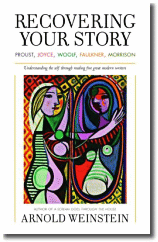This passage is from a more extensive excerpt you can read here; and if you're looking for a spur to finally digging into Proust's massive novel, it's right near the beginning.Consider, for a moment, what the great novels of the nineteenth century offer us: a form of historical portraiture. Balzac chronicles the "new" capitalist order in his Le Père Goriot of 1835, in which
the traditional allegiances of family and love are brutally torn asunder by the cash nexus. Dickens gives us his version of the same story in book after book, perhaps never more perfectly than in the adventures and misadventures of Pip in Great Expectations. Of course, such novels have memorable characters, but their mission seems to be one of social illumination, to reveal to a hungry and curious readership the real workings of their contemporary society. Stendhal's accounts of post-Napoleonic France map out with great acuity the new political horizons. Tolstoy tackles nothing less than the great Napoleonic wars themselves, in his saga War and Peace, in which individual subject, family, gesture, and fate are inscribed in the convulsions of Europe at war, of Russia under siege. These are all large-souled enterprises, bent on delivering a new kind of map, one that registers the tremors produced (in people and in societies) by changing values, by political upheaval, by social unrest. Readers flocked to these stories, which often appeared in serial form, in order better to grasp their own conditions. The novel was in its prime; you read this "walking mirror" to gauge your own circumstances by understanding the world around you.Fast-forward to 1912, when Proust publishes Swann's Way (Du Côté de chez Swann): "What is
going on here?" The rules of the game have changed, and the result is a complex, convoluted narrative whose bottom seems to have dropped out. "Where's the beef?" one might legitimately ask. What, where is the story? Capitalism, Napoleon, London and Paris and St. Petersburg have gone up in smoke. Stendhal's moving mirror is still there, but the depiction of society--Realism's central agenda--no longer matters, has disappeared from the page. In its stead, one encounters . . . a piece of pastry [la madeleine] dipped in tea. Many readers in 1912, and many readers since 1912, have thought that Proust's book was absurdly narrow in its charge, too limited in its focus, locked into the thoughts and sensations of one (neurotic) figure, and hence locked out of fiction's supposed goal: to paint a picture of the world we live in.
Of course, Proust is doing exactly that, but in new ways: painting the world we live in. But that world is the self. Here is indeed the brave new world. Proust's mission, far from being narrow or solipsistic, is to show you that the self is a world, is the world we live in, the world we can never get out of, and-most provocatively of all-it is the world we do not know, the world we can live in and die in without ever knowing.
A short profile in the Guardian notes that Proust "draws mixed responses:"
Henry James characterised reading Proust as "inconceivable boredom associated with the most extreme ecstasy which it is possible to imagine"; Joseph Conrad bluntly saw "no emotion" in it, while Virginia Woolf had a momentary fear that Proust had achieved all that was possible in the novel. He did meet Joyce, in difficulty and length as well as style perhaps his true successor, but rather than swapping tips on sentence structure each simply moaned about his respective health.Arnold Weinstein clearly remembers the first time he read James Joyce's acclaimed novel, Ulysses. "I thought it was gibberish. I read 100 pages and put it down. It was unthinkable that anyone could possibly make sense of it." Of course, that opinion changed.
--Marshal Zeringue






